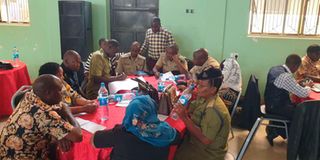Activists target boda bodas to end cross border FGM

Anti-FGM stakeholders draft a work plan to counter cross-border FGM in Tarime, Tanzania, on May 27, 2022.
What you need to know:
- Anti-FGM activists in Kenya and Tanzania have shifted focus to the boda boda sector and youths to help end cross border cuts.
- The riders are actively involved in sneaking girls across the porous border to undergo the cut.
- UNFPA estimates that more than 1,OOO girls are at a risk of being subjected to FGM during school holidays.
Activists opposed to the retrogressive Female Genital Mutilation (FGM) in Kenya and Tanzania have shifted focus to the boda boda sector and youths to help end cross border cuts ahead of the December school holidays.
During a two-day multi-agency cross border meeting held at a Tarime Hotel in Tanzania, it emerged that the riders are actively involved in sneaking girls across the porous border to undergo the cut before they are ferried back to their homes.
UNFPA, the United Nations sexual and reproductive health agency, estimates that more than 1,OOO girls are at a risk of being subjected to FGM during school holidays, hence the need to sensitize the boda boda sector.
“We have a capacity of saving up to 400 girls from the cut, but this can be scaled up when we rope in the boda boda sector in the exercise,” noted Valerian Mgani, a programs manager at the Association for Termination of Female Genital Mutilation (ATFGM) an associate partner of UNFPA.
Investigations by nation.Africa revealed that boda bodas are used in the cross border movement of the girls during FGM seasons, with Tanzanian authorities recording 13 cases that were prosecuted.
“It is tricky tracking their movement owing to the porous borders and the secrecy in which the practice is conducted,” notes Fatuma Mbwana, an officer at the Gender department at Tarime Police Division.
In Tanzania, nine clans are bracing for the cut despite tight surveillance by anti-FGM crusaders and law enforcers.
They include Timbaru, Nyabasi, Nyamango Wairegi, Wakira, Wasweta, Wahuruyaga, Wakenyi and Wanchari.
Enhanced vigilance
The Bumera and Renchoka clans subjected girls to FGM in December, paving way for the other nine.
But Tarime Regional Community engagement officer David Mathew assured the stakeholders “of enhanced vigilance and drastic response should there be a case.”
“Just as we helped curb FGM cases in April, we are on the lookout this coming holidays to ensure our girls are safe from the vice,” he said.
In Kenya, activists are banking on youths to create a generational gap that will see the practice fully rooted out.
The activists noted that the despite the presidential decree seeking to have the vice ended by the end of 2022, bringing youths on board would bring a generational change that would see the vice not carried to the next generation.
FGM has drastically reduced but not completely eradicated in Migori.
In the past, activists have targeted elders, the key custodians of cultural laws governing FGM.
“Despite most communities performing female cut with the knowledge that it is illegal, misconception and stigma against the vice still persists, affecting its complete eradication,” Charles Olwamba, Amref Health Africa program officer said.
According to Mr Olwamba, myths like uncircumcised girl not being allowed to fetch vegetables or water, and that circumcision among girls end promiscuity in marriage, are still rife among the Kuria community.
“To end of these myths, we have been empowering youths through grass root organizations and lead activists to change a generation completely,” he said.
Cultural circumcision
Mr Olwamba was speaking in Kehancha town after training more than 30 local community-based organizations on ending the vice within a generation.
Vincent Mwita, programs coordinator for Tunaweza Empowerment said despite Kuria being a religious community and most people from the region being law abiding, the irony of open end celebrations during cultural circumcision is baffling.
“We are always left to wonder why a society, which propose Christianity and Islam, can openly celebrate an event which has no foundation in the Bible and in the Quran,” he said.
Earlier, Agnes Pareyo, the chairperson of Kenya Anti-FGM Board, said they have been supporting the network of youths as they have the biggest potential of change in future.
“The FGM rate in the country stands at 21.8 per cent, to have the vice abandoned within a generation, we count on youths who are themselves parents and above all, next generation elders who will make important cultural decisions,” she said.
Ms Pareyo said the biggest impediment to fighting the vice are elders and older generations who are slow to change, but youths “can reach a wider audience as they have passion, potential and easy to change with power of social media opening new ways of communication.”
“Through the youth network, we have a group of opinion shapers who will take up after their elders to stand against cultural impunity,” Ms Pareyo noted.





